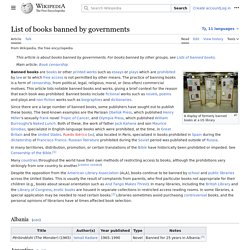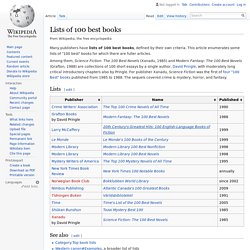

How to Read a Book. How to Read a Book was first written in 1940 by Mortimer Adler. List of books banned by governments. Wikipedia list article A display of formerly banned books at a US library In many territories, distribution, promotion, or certain translations of the Bible have historically been prohibited or impeded.

See Censorship of the Bible.[1] Many countries throughout the world have their own methods of restricting access to books, although the prohibitions vary strikingly from one country to another: hate speech, for example, is prohibited in a number of countries, such as Sweden, though the same books may be legal in the United States or United Kingdom, where the only prohibition is on child pornography. The 100 Best Books of All Time. Many publishers have lists of 100 best books, defined by their own criteria.

This article enumerates some lists of "100 best" books for which there are fuller articles. Among them, Science Fiction: The 100 Best Novels (Xanadu, 1985) and Modern Fantasy: The 100 Best Novels (Grafton, 1988) are collections of 100 short essays by a single author, David Pringle, with moderately long critical introductory chapters also by Pringle. For publisher Xanadu, Science Fiction was the first of four "100 Best" books published from 1985 to 1988. Time's List of the 100 Best Novels. Watchmen (1986) by Alan Moore and Dave Gibbons appears on both the 100 Best Novels and 10 Best Graphic Novels lists, giving the combined lists 109 entries.
References[edit] See also[edit] Le Monde's 100 Books of the Century External links[edit] List Description at Time.comFull List at Time.comList description of the 10 best Graphic Novels at Time.com. Learning to read. Writing systems[edit] Writing systems are distinguished from other possible symbolic communication systems in that one must usually understand something of the associated spoken language to comprehend the text.[2] Once established, writing systems on the whole change more slowly than their spoken counterparts, and often preserve features and expressions which are no longer current in the spoken language.
The great benefit of writing systems is their ability to maintain a persistent record of information expressed in a language, which can be retrieved independently of the initial act of formulation.[2] Acquiring reading[edit] Thus, the ideal process of what is called emergent or early literacy[3] begins in the relationship between hearing spoken language, seeing written language and feeling loved. Reading development[edit] There are five stages of reading development. Homer on the Internet. The Iliad by Homer. The Odyssey by Homer. The History Guide. KAIROS InBox: Beyond the MLA Handbook (Harnack/Kleppinger) Andrew Harnack and Gene Kleppinger When our rhetoric students need to cite Internet sources in their writing projects, we've found some helpful (but often confusing) style sheets on the net.
We like the simplicity of Janice Walker's "MLA-Style Citations for Electronic Sources. " We note difficulties, however, with her citation of some Internet source information. Other style sheets are similarly inadequate. In our essay linked to this issue of Kairos, we identify four areas of citation practice needing improvement and recommend better models. We think teachers of writing in webbed environments will encounter many situations where students need to know how to cite Internet sources effectively. We invite all KAIROS readers to peruse our full paper which. Citing Electronic Information in History Papers. By Maurice Crouse Department of History, The University of Memphis <mcrouse@memphis.edu> 8 May 2013 Copyright © 1995, 1996, 1997, 1998, 1999, 2000, 2001, 2002, 2003, 2004, 2005, 2006, 2007, 2008, 2009, 2010, 2011, 2012, 2013 by Maurice Crouse.
You may freely reproduce this document, provided that you reproduce it in its entirety and without any modification. This document is available in a Slovenian translation by Victor Zdrawlica at Index IntroductionThe Basis of My RecommendationsModels and Examples Individual Works Parts of Works Periodicals and Journals Newspapers and Magazines Abstracts and Reviews of Individual Works Abstracts and Reviews of Periodicals and Journals Electronic Mail (Personal) Electronic Conferences, Interest Groups, Newsgroups (Usenet), and Lists Searches in Online Library Catalogs and Databases Government Publications and Legal DocumentsFinding and Using the Information for CitationsImplications for MethodologyBibliography Crouse, Maurice. 8 May 2013. U.S. U.S. A Brief Citation Guide for Internet Sources in History and the Humanities.
A BRIEF CITATION GUIDE FOR INTERNET SOURCES IN HISTORY AND THE HUMANITIES (Version 2.1) by: Melvin E. Page 20 February 1996 for:H-AFRICA Humanities On-Line andHistory Department University of Natal at Durban Durban, South Africa phone: 27-31-260-3104 fax: 27-31-260-2621 The following suggestions for citations of Internet sources in history and the humanities are derived from the essential principles of academic citation in Kate L.
Since version 1.0 appeared, many people have raised issues about both internet and humanities citation standards. Since the Internet is an evolving institution, this Guide is not intended to be definitive. When the need for further revisions and updates become apparent, new versions of the Guide will be issued. Or through gopher at: <gopher.h-net.msu.edu> [path: H-NET E-Mail Discussion Groups/H-AFRICA/Internet Citation Guide] Another problem involves the citation of e-mail correspondence.